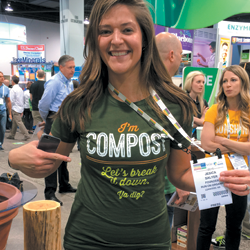
egos may seem like just fun and games, but when Cramer based its booth on the classic children's toy, it wasn't playing around. At the Healthcare Convention & Exhibitors Association (HCEA) Annual Meeting in 2007, the Norwood, MA-based event- and digital-marketing company used the interconnecting blocks as a metaphor for its expertise.
Just as the colorful plastic blocks click together to make
all sorts of connections, Cramer wanted to show how its event- and digital-marketing services can help companies connect with audiences and build relationships. With more than half of its customers in the health-care industry, Cramer headed to HCEA in 2007 as a first-time exhibitor looking to make more connections with the roughly 800 health-care exhibit and convention marketers, medical-association exhibit managers, and medical-meeting planners in attendance.
Prior to HCEA, Cramer had exhibited in several shows with a tabletop exhibit, tablet PCs, and plasma screens to showcase its digital-marketing capabilities. But as the new kid on the block at HCEA, Cramer needed to show more than its high-tech services. It needed to differentiate itself from the sea of mostly 10-by-10-foot booths. Moreover, at a show where most attendees pre-plan the exhibits they want to visit ahead of time and don't do much browsing, Cramer had to figure out how to connect with qualified attendees and make it onto their itineraries.
"We had to figure out how we could stand out and attract an audience to our booth. We needed to demonstrate to the attendees that we had a solution for them and that we're worth talking to," says Ann Cave, senior vice president of strategy and marketing at Cramer.
However, building interest with traditional trade show tactics proved more difficult than Cramer expected. HCEA show rules prohibited exhibitors from running drawings, raffles, or other contests. And by the time Cramer signed its space contract, most of the sponsorships had already been purchased.
Looking at these challenges as opportunities, Cramer got creative and turned its attention to developing an integrated program full of connections. "We wanted to create a theme that played off of the way marketing builds connections - because that's what we do," Cave says.
Brainstorming for an innovative way to bring its ability to forge connections to life, Cramer settled on well-known, recognizable Lego blocks. Through its interconnected Lego program and booth activity, Cramer wanted attendees to see it as a company worth connecting with - and get them into the booth where staff could meet with them in a fun, relaxed environment. During the three-day show, Cramer hoped to generate 25 qualified leads while increasing visits to its main Web page and a health-care Web page developed to showcase its portfolio of work for clients in the health-care industry.
Play Date
To get attendees to its booth, Cramer knew it would have to catch their attention ahead of time to make it onto their schedules. The company also wanted to direct attendees to its health-care Web site to ensure they took a look at Cramer's portfolio to get an idea of its offerings.
So Cramer sent a bi-fold mailer to 200 pre-registered attendees two weeks before the show. The Lego-themed mailer featured a photo of Lego toys and Cramer's key message: "Partner with Cramer to build successful meetings and events that connect with your audiences." It also invited attendees to visit Cramer's booth to build their own "Lego likeness" - a Lego figure with custom health-care clothing and a wide variety of accessories.
To direct traffic to its Web site, the playful invitation encouraged attendees to visit a micro site created specifically for promoting its involvement in HCEA. Here, attendees could register for a free Forrester Research report on social computing in health care. The micro site and the research report detailing how health care has made use of Web 2.0 helped Cramer play up its digital-marketing savvy and ability to make connections through multiple mediums.
At the micro site, attendees could also browse biographies of key Cramer personnel attending HCEA. But to give them a taste of what they could expect in its booth, the site included not actual photos of the staff, but pictures of their "Lego likenesses." The micro site also linked directly to the health-care Web page, spotlighting Cramer's work with various health-care clients.
Connect the Blocks
Much like the micro site, Cramer's 10-by-10-foot booth contained loads of Lego imagery. A custom-made 3-D Cramer logo sitting on the floor in the company's booth was made out of orange and white Lego blocks by acclaimed Lego artist Nathan Sawaya. Multi-colored acrylic panels made to look like oversized Legos surrounded a large plasma screen and backlit graphics on the booth's back wall. The plasma screen looped key messaging about the company throughout the show with imagery designed to match the Lego theme.
But the exhibit's undeniable focal point was a table of clear containers brimming with hundreds of Lego parts. To build their own mini-figure, attendees selected from a variety of body pieces representing nurses, doctors, and health-care professionals. Then they chose from hairstyles, hats, and accessories ranging from fishing poles to walkie-talkies - allowing attendees to show their interests.
In the serious field of health care, Cramer's fun activity let attendees relax and talk about themselves - allowing Cramer to show how it is able to create "personalized connections," Cave says. "It was a great conversation starter. Salespeople could say something like 'I've got a blond piece of hair that'd be great for you,' and once they were engaged in a conversation, the salesperson could move on to asking, 'What do you do? How can I help you make connections?"
|
Once attendees had assembled their Lego likenesses, staffers attached the miniature figures to a customized Lego block labeled with Cramer's logo and Web site. Then they put the likeness into a plastic baggie, which contained literature outlining Cramer's offerings for events and digital marketing made to order for the health-care industry. The collateral piece also directed attendees to Cramer's Web site, and, of course, its design featured Lego blocks and figurines and invited attendees to "Build lasting connections with Cramer." Finally, the staffer who helped the attendees assemble their Lego likeness inserted his or her business card into the bag.
After taking time out to play with the toys, interested attendees viewed examples of Cramer's work on tablet PCs located on a table in the back of the booth. Between the Lego-themed activity and the resulting discussions with staffers, Cave reports that most booth visitors stayed for an average of five to 10 minutes.
But after it packed up its toys and left HCEA, Cramer wanted to reconnect with attendees one more time. So, about a week after the show, it sent them a thank-you letter on customized letterhead with a picture of a Lego figure. To sweeten the deal, Cramer also attached a package of Lego-shaped candy to each letter, thanking attendees for "connecting with Cramer" and encouraging them to visit Cramer's health-care Web site.
Building Awareness
Cramer's results proved that it's Lego-centric integrated program tapped into much more than just child's play: Its booth generated 50 qualified leads - more than double its goal. The micro site also proved to be the most-visited and longest-viewed pages on Cramer's health-care Web site during the month before and month of the show, with the average visitor surfing the site for a whopping 10 minutes. Even better, the micro site helped Cramer meet its goal of increasing traffic to its main page and health-care Web site, as visits during the month of HCEA increased by 20 and 51 percent, respectively, over the previous months' averages.
Sizzle Awards judges praised every component of Cramer's integrated program from its Lego theme to its micro site to its in-booth building activity. "If you're a new company at a show full of established players, you have
to do something innovative and perhaps a little risky to break through the clutter," said one judge. "This certainly doesn't scream digital media company, but it screams - and people will remember it." e
|





 Establish Cramer as a credible player and get attendees to open up in a relaxed atmosphere.
Establish Cramer as a credible player and get attendees to open up in a relaxed atmosphere.



